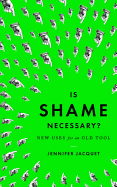
In Is Shame Necessary, Jennifer Jacquet argues that shame can be an effective tool to change harmful social, economic and environmental practices. Shame's effectiveness, she posits, relies on a number of factors, including audience, focus and implementation. But not everyone has the ability to wield this old tool; used poorly, it can be counter-productive.
Jacquet--a professor of environmental studies at New York University--provides many examples, among them a public shaming campaign against the tuna-fishing industry for the mass killings of dolphins in tuna nets. The voluntary "dolphin-safe" practices (better nets that reduced the number of dolphins caught and killed) put the focus of fixing the problem on individuals who could boycott tuna and only roundaboutly on the groups engaged in the damaging practice. Because the standards were voluntary, the impact was small until the later enactment of federal regulations mandating dolphin-friendly fishing.
When it comes to large-scale problems, Jacquet says, shame needs to come from a source of influence. A successful example was the state of California's threat to publish a list of the top 500 business tax delinquents. Those who paid their outstanding taxes were taken off the list before publication. The state has recovered approximately $301 million in unpaid taxes since 2007 as a result.
Jacquet offers guidelines to use shame as an instrument for good, and provides concrete examples for how American society can use public shaming to ensure it remains an effective tool. --Justus Joseph, bookseller at Elliott Bay Book Company

